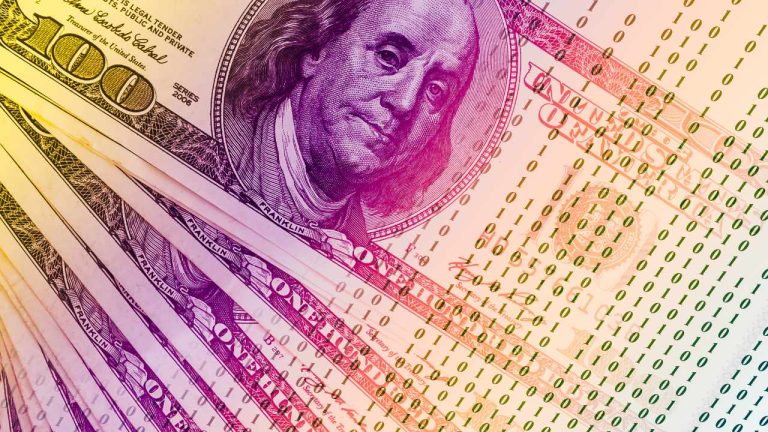Insights and analysis for the professional investor Was this newsletter forwarded to you? Sign up here. |
|
|
Welcome to Crypto Long & Short! This week, Glenn Williams Jr. explores how the debt ceiling battle relates to crypto. Then, Nathan Cox of Two Prime argues against complacency amid the recent calm in bitcoin (BTC) and ether (ETH). As always, get the latest crypto news and data from CoinDeskMarkets.com.
– Nick Baker
|
|
|
Washington Ignored Crypto for Now. That's Good for Bitcoin. |
So, there was a deal resolving the U.S. debt ceiling battle in Washington, D.C. Now what? First, let's look at where we are. The words "crypto" and "cryptocurrencies" don't appear at all in the initial version of the deal. I wrestle with whether that's good or bad. The Digital Asset Mining Energy (DAME) excise tax wasn't included, so I've landed on the former since the omission is positive for the industry. The proposal would've levied a 30% tax on any firm using computing resources to mine digital assets. The premise was driven by concerns about the consumption of fossil fuels in mining, and subsequent environmental harm. Ironically, the debt ceiling agreement may be viewed as a win for fossil-fuel advocates. It includes a provision for the expedited completion of a natural-gas pipeline between West Virginia and Virginia (the Mountain Valley Pipeline). That is expected to transmit natural gas from the Marcellus and Utica shale gas fields to markets in the Mid- and South Atlantic regions of the U.S. At first glance, this provision may actually be a positive for bitcoin (BTC) miners. Since some of them use excess natural gas as an energy source, several have previously set up operations near the Marcellus and Utica Shales to accomplish this. Increased infrastructure for natural gas may lead to increased production, and thus increased excess gas, resulting in increased sources of energy for miners in the region. I would label this as an indirect benefit, and definitely one that was unintentional. Indirect benefits notwithstanding, bitcoin reacted favorably to the agreement, with prices increasing 4% on Sunday. The move higher seems related more to increased certainty, and at least a sigh of relief that nothing antagonistic towards crypto was included. |
The price increase ranked 10th in daily moves for 2023. Where do we go from here? A quick look at the schedules for both the House and the Senate indicate nothing currently planned as it relates to hearings. Total public debt will undoubtedly rise, as will the amount of interest payments being made by the U.S. |
The spread between 2- and 10-year Treasury yields remains negative, as short-term debt rates remain higher than longer-term debt. The problematic nature of the inverted yield curve can't be ignored. It's the equivalent of telling someone that you have more faith that someone will be able to pay you back in 10 years than in two – not exactly a ringing endorsement of present economic strength. An increased issuance of bonds could occur, as the U.S. looks to rebuild its balances within the Treasury General Account – the result of which could be a withdrawal of liquidity from financial markets, and a potential headwind for bitcoin prices. Another interpretation could be that the latest chapter of borrowing and spending will be viewed as exactly the reason why cryptocurrencies hold value. Particularly those with hard monetary supply caps like bitcoin. Advocates for ether (ETH) will likely trumpet its deflationary nature. What will be interesting to see is the extent to which cryptocurrencies become a political football in 2023 and moving forward. Both sides of the aisle include individuals both for and against digital assets. Admittedly, it's taken a decidedly more partisan turn over the last year, which I view as problematic. The exclusion of a crypto mining tax allows the current administration the latitude to state that they took no negative action versus bitcoin, avoiding an issue that still appears to be very much up for grabs. It will be important over time to keep an eye on who says what about crypto assets in the political realm. But as it relates to this most recent debt deal, not much was said at all. |
|
|
Cboe Digital is a U.S. regulated exchange and clearinghouse bringing trust and transparency to the crypto spot and derivatives markets. Cboe Digital honors a separation of duties and includes intermediaries as a key tenet in managing risk and avoiding conflicts of interest. Our unified spot and derivatives markets are underpinned by responsible innovation and enable collateral efficiency. www.cboedigital.com. |
|
|
Sell Crypto Volatility in May, and Go Away? |
As we approach the halfway mark for 2023, the year has been difficult to characterize for both equities and digital assets. Ongoing debates about the macroeconomic picture, both at home and internationally, have analysts wondering when the next shoe will drop. In March, when I wrote about the U.S. banking crisis, digital assets were rallying to annual highs, touted as a safe-haven asset and hedge against financial Armageddon. Since then, almost any meaningful headline has been shrugged off as unimportant. In the face of bank instability, the ongoing war between Russia and Ukraine, a 25-basis-point rate hike in May, a looming global recession and the U.S. debt-ceiling fight (that may or may not be resolved), digital assets (and equities) have seemingly lost interest in all conventional narratives that would normally spark a reaction from investors. In trading terms, both realized and implied volatility have drifted into all-time-low territory. Bitcoin's (BTC) range over the past two weeks has been reduced to 6.3% with 30-day realized volatility at 42.1 (4th percentile on a one-year lookback) and ether (ETH) stuck in a narrow 7.1% range, with 30-day realized vol at 41.9 (1st percentile over a one-year lookback). |
|
|
30 day ETH and BTC Realized Volatility: 2y lookback (Source: Amberdata.io) |
To take advantage of the ever-decreasing volatility in digital assets, traders are pressing short vol bets, wagering that the current conditions will persist, and with major market makers like Jane Street and Jump Capital reportedly slowing their crypto trading, maybe they are right. But can it really be that simple? "Sell volatility in May and go away?" Or are investors ignoring meaningful signals that could push bitcoin and ether out of their recent boundaries? The June 1 debt-ceiling deadline emerged recently as the obvious candidate for a binary volatility event. And for good reason: A default would send shockwaves through markets worldwide. In response to the uncertainty around this, bond markets have been pricing in risks, with 2- and 30-year Treasury yields rising sharply in May. And the U.S. Dollar Index (DXY) has initiated a strong double bottom rally off the 101.0 level. Typically, holding above this level hasn't been good for bitcoin. A simple look at the chart below gives some perspective on the inverse correlation between bitcoin and DXY. |
Suffice to say, the recent calm in bitcoin and ether volatility should not lull market participants into a false sense of security. As the winds of macroeconomic change continue to blow, and underappreciated narratives start to play out, we could witness the sharp return of volatility that these assets are known for. If the "higher for longer" narrative continues to play out, expect a sticky dollar index above 101, and ongoing pressure for digital assets as investors navigate these murky waters. – Nathan Cox, chief investment officer at Two Prime |
|
|
Crypto storage doesn't have to be hard and should never come at the expense of security. Introducing Bridge Trust. We're a regulated trust company offering one of the first enterprise-grade custody solutions to individuals and businesses alike. Whether you're just getting started in crypto or a seasoned investor seeking a hard wallet alternative, Bridge Vault will let you rest easy knowing your funds are secure and fully segregated. Open an account today. |
|
|
From CoinDesk Deputy Editor-in-Chief Nick Baker, here's some news worth reading: |
- BITCOIN POLITICS: It sure looks like crypto, bitcoin and central bank digital currencies (CBDCs) are going to be hot topics on the campaign trail leading up to the 2024 U.S. presidential election. "The current regime, clearly, has it out for Bitcoin," Ron DeSantis, the Florida governor and Republican candidate for president, said last week. "And if it continues for another four years, they'll probably end up killing it." One can't help wondering if this is bait for libertarian-minded crypto advocates who might view Republicans' attacks on civil liberties (anti-abortion and anti-trans legislation, book bans, etc) distasteful. And here's CoinDesk's Daniel Kuhn on the growing culture war around bitcoin.
- SEC FRIENDLY: Much of the talk around crypto lately has involved big industry players arguing U.S. regulators have been opaque and frustrating to work with. And, yet, this CoinDesk piece explains how a couple companies, Prometheum Ember Capital and OTC Markets Group, have just figured out how to use existing rules (not ones especially tailored to crypto) to get themselves approved to operate in the crypto space. Food for thought!
- BUY AND HODL: The long-term trend with U.S. stocks has been clear: people are holding equities for less and less time. Warren Buffett's approach is not ascendant in stocks. However, over in bitcoin – an asset class the Oracle of Omaha hates – his long-term approach is how things work! Investors are hanging onto BTC longer than ever. It's doubtful this'll persuade Buffett to dive in, though.
- WORLDCOIN'S DEAL: Worldcoin, the project that was founded by OpenAI CEO Sam Altman, just raised an eye-catching $115 million in venture funding. Worldcoin is the creator of World ID, a privacy-focused decentralized identification project. There is an artificial intelligence angle, which probably explains the big dollars. "As we embark on the age of AI, it is imperative that individuals are able to maintain personal privacy while proving their humanness. In doing so we can help ensure that everyone can realize the financial benefits that AI is poised to deliver," said Alex Blania, CEO and co-founder of Tools for Humanity, the team behind Worldcoin.
|
|
|
|
























